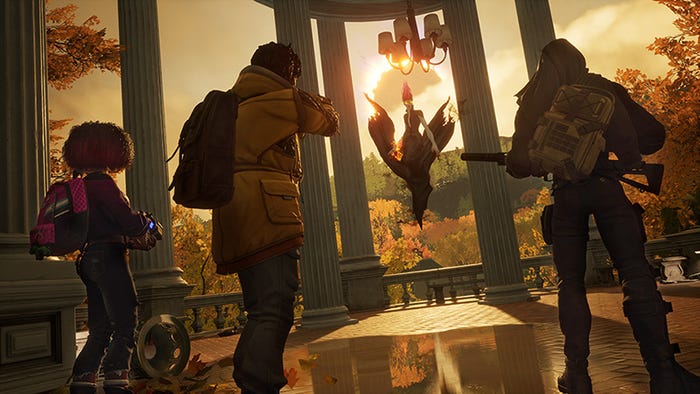Blogged Out: 'The Bully Percentage'
In his latest 'Blogged Out' column, veteran UK writer Jim Rossignol takes a look at the world of developer blogging - this week including Gears Of War's blogger reviews, Bully and social responsibility, and the 1% rule.

Welcome to 'Blogged Out', the news report that looks at the world of developer blogging and the conversations being had with the community at large. This week includes Gears Of War's blogger reviews, Bully and social responsibility, and the 1% rule. Gearing Crowds The spread of critical reactions to Gears Of Wars has been interesting. While most reviews have come in with >90% scores (the 8/10 on Eurogamer.net spawned a 1000-post thread of comments) it seems that bloggers from the industry have been a little more measured in their commentary. I’m increasingly finding that bloggers come up with the best analysis of games, perhaps because they don’t try to do full-blown reviews that adheres to any particular template. (Cue the old moan about tailoring reviews to fit old magazine methodologies…) Stuart Roch from Treyarch lists a number of now-familiar observations about Epic’s design decisions: “90% of the time when I’m running I bump into things accidentally that I don’t want to cover on, putting me in harm's way as I inadvertently stand up in the line of fire. Maybe everyone else doesn’t have this problem, which would explain the designer’s decision here.” Don’t worry Stuart, you’re definitely not alone. Serious Bullying Speaking of good reviewing, I’ve just been reading through Ian Bogost’s discussion of the significance of Rockstar’s Bully over on Serious Games Source. Bogost has quite a bit to say about the worth of the game, and points out numerous problems. It’s a good critique – one that looks at what we might actually expect from a game about bullying. Bogost uses his personal angle on games (as one of the minds behind Persuasive Games ‘advergaming’ concept) to illuminate what Rockstar are doing. But what particularly interested me, and a few other bloggers, was what Bogost had to say about the general state of commentary on the controversial title – about what the industry has said and how they’ve said it. “No matter how absurdist the public response to Bully might seem to those deeply immersed in video game culture, the game community’s own responses are framed almost entirely within the language and issues of that public debate. Nowhere do game reviewers, players, journalists, or developers discuss the game’s meaning on its own terms—neither in praise nor riposte. We can understand this state of affairs through the lens of “seriousness.” On the one hand, the public detractors of Bully do take the game seriously, as a threat and a danger but not as a cultural artifact. The video game community, on the other hand, does not take the game seriously at all. It is allowing the legislators and attorneys and media watchdogs define the terms of the debate. Rockstar doesn’t help matters, and not just because their releases seek out controversy to create a wake of free publicity. More so, they exacerbate the ambiguous meaning that surrounds the game by remaining silent about it. When Hollywood studios release films, even controversial ones, they launch huge press junkets to discuss them.” Bogost goes on to argue that Rockstar’s failure to explain themselves, together with the problematic nature of the gameplay, means that the game can easily be characterized as “little more than a provocation”. Now, the idea that the games press really isn’t trying hard enough seems like excepted wisdom these days, and what Bogost says about the general failure of critical analysis seems entirely justified. But is it fair to say that Rockstar have failed their game, and we the gamers, by remaining silent? Moreover, do the problems that Bogost outlines mean that, as he contends, Rockstar didn’t take the game seriously enough? I find it difficult to reach the same conclusion. Rockstar have made a game that they intend to be entertaining enough so that it makes money. It’s the job of the press to analyse that and to react to this strategy, but I don’t believe that Rockstar in turn have a responsibility to defend it. I’ll play Devil’s Advocate for a moment, and argue that game developers only have a responsibility to make games, no matter the value of the content of those games. What right have we to demand that they defend or explain their “artistic intent”? Perhaps I’m on the wrong track – after all we do want games development to be more intelligent and less exploitative on sensation and controversy – but I feel that more accountability on the part of developers only ends up inhibiting inspiration. I’m not sure we can afford that trade-off. And I like ambiguity, most of the time. In fact Rockstar’s silence would probably be at its least interesting if it were broken by the team themselves. I would much rather it was provided by some smart investigative journalism… "Who do Rockstar think they are? We investigate!" There's a feature everyone would read. One Percenter Finally, an interesting piece of editorial from the UK Guardian suggests something about how online content functions in terms of the number of people interacting with it. “It's an emerging rule of thumb that suggests that if you get a group of 100 people online then one will create content, 10 will "interact" with it (commenting or offering improvements) and the other 89 will just view it.” The feature argues that YouTube’s user statistics illustrate this fairly accurately. Nevertheless I would love, from a gaming angle, to see whether Second Life, or the various mod tools provided with PC games, were able to illustrate the 1% rule too. Such information, sadly, appears to be currently undisclosed. (Please email me if I'm wrong/slow!) [Jim Rossignol is a freelance journalist based in the UK – his game journalism has appeared in PC Gamer UK, Edge and The London Times.]
Read more about:
2006About the Author(s)
You May Also Like













